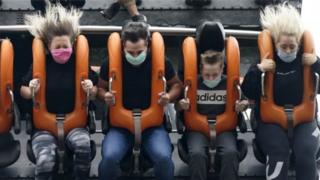Coronavirus: Visitors may not see the thrill of VAT cut
 Image copyright PA Media
Image copyright PA Media A reduction in VAT might not cut the price of a family trip to the rollercoasters, but venues hope it may give their sector less of a rocky ride.
Chancellor Rishi Sunak has announced a temporary drop in the sales tax from 20% to 5% for attractions, meals and accommodation.
A family ticket to the zoo of £144 could, in theory, become £18 cheaper.
But experts predict many businesses will not cut prices, instead using the money to save their ailing businesses.
Price cuts?
The chancellor said the VAT rate on food, non-alcoholic drink, accommodation and attractions in the UK would be cut to 5% between 15 July and 12 January.
In theory, the rate change could mean a couple buying a pub meal costing £45 without alcohol would save £5.62, while a £54.50 one-night stay at a hotel in a family room would see a saving of £6.81, according to accountants Deloitte.
In practice, venues may decide to keep prices the same, but keep the extra money they would have sent to the tax authority. Providers will not refund those who have booked and paid for accommodation later in the summer, because the rate is for when the sale was made.
Many of these businesses find themselves on the brink, given they were closed for months during lockdown, and the Treasury believes that the choice should remain with these operators, rather than the government, on whether to pass on savings.
Ministers may hope to get somewhere close to the reaction of a VAT cut in 2008, when eight in 10 firms said they passed it on, although that was a much more wide-ranging policy.
This latest cut marks a move towards more targeted support for the worst-hit sectors of the economy.
Kate Nicholls, chief executive of trade body UK Hospitality, said: «This [VAT change} doesn’t mean we are out of the woods and there are still significant challenges ahead.»
The biggest of these was the rent payments that many of these businesses still needed to pay, despite not having any income for weeks.
The policy will mean many businesses in the hospitality sector will be operating on three different rates of the sales tax.
Alcohol will see a 20% VAT rate, there is a 0% VAT rate on cold takeaway food, and everything else will now see a temporary 5% rate.
This would add an extra administrative burden for the sector, said Alison Horner, from accountants MHA MacIntyre Hudson.
There is concern, too, about the timing of the latest cut.
Although the summer holidays mean many families will be free to visit attractions, they still may be nervous in doing so.
They may be worried about coronavirus. They may not fancy the idea of booking days, or possibly weeks, in advance, as venues have reduced their capacity. They might not like the potential of having to queue at a social distance.
Wasted giveaway?
If the venues themselves could not increase the number of customers owing to virus restrictions, then the VAT would just be a giveaway not targeted at those who were struggling, the Institute for Fiscal Studies said.
Tax specialist Chas Roy-Chowdhury argued that the chancellor could have delayed any VAT cuts until a vaccine was found and people returned to some kind of normality.
This would give the UK economy some significant «momentum» at that time, he said, rather than a watered-down version now.
Others, including many venues, would argue that without any stimulus now, many of these restaurants, cinemas or attractions simply would not survive until then.

